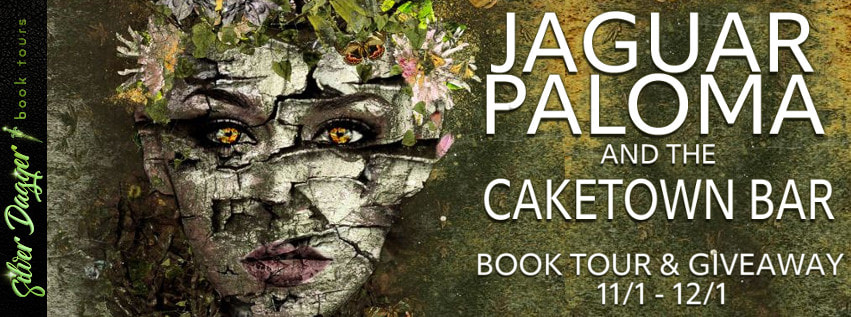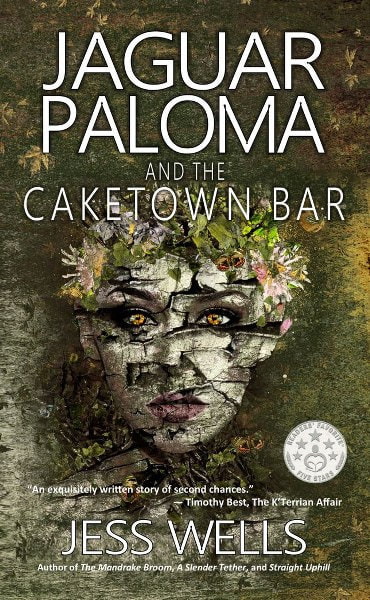Amid drunken monks, a roaring trade in faked marriages just for fun, and the Romani, all balance on the knife-edge between legality and the illicit.
Published: July 2021
In 1865 in the shanty town of Tartatenango, the Caketown Bar is owned by the extraordinary Jaguar Paloma, matriarch of a village that is home to raucous miscreants, cast-off mothers, muleteers, and forgers. Amid drunken monks, a roaring trade in faked marriages just for fun, and the Romani, all balance on the knife-edge between legality and the illicit. Paloma’s life is honed by this community, as their lives are affected by her mystery and magic.
Co-founder of this extraordinary gathering is Orietta Becerra. Breathtakingly beautiful and ambitious, her distillery builds the success of Caketown. But when she crosses the tracks and marries the town’s mayor, her double life severs her friendship with Paloma and the town starts to pay the highest of prices.
Adding to this land of chaos and feminine power is a forger, a murderer, the darker shade of the female heart, and a Civil War that claims men before their time.
Caketown – men want to destroy it. Women want to play in it. The township itself has to fight on all sides to survive.
Told in evocative magical realism, Jaguar Paloma and the Caketown Bar is a tale of wronged women who stand up to be counted.
AUTHOR'S Q&A
Q: Why did you decide to write it in the style of magical realism?
In a way, this is a homage to Gabriel Garcia Marquez so it can’t be in any other form, can it? I’m kidding of course but it’s a style I love to read and have always longed to write. It has been creeping into my writing over the years and I'm so excited to be able to pull off in a full-length novel in it. For example, in The Mandrake Broom the protagonists doesn't age like others do because of a potion given to her by her mother. In A Slender Tether, the doctor in "The Gong Farmer's Tale" is sealed up in a cave by a bear. There is a tiny bit in Straight Uphill when people arrived to honor the hero of World War I. But this is the most extensive use of magical realism in my writing to date, and it was absolutely the most fun I have ever had writing anything.
Q: What was the genesis of this story? How did you come up with it?
I love the writing of Gabriel Garcia Marquez. One Hundred Years of Solitude is one of the finest books written, ever, in my opinion. I have read it five times and the last time I read it the relationships and positions of the women started to jump to the foreground. For example, Pilar Tennara the saloon keeper and Ursula, the matriarch of the Buendia family, were among the founders of the town and yet Ursula refuses to allow Pilar to attend a founders’ dinner because she has given birth to Ursula's illegitimate grandchildren. I thought "wouldn't that hurt Pilar's feelings?" It brought up the whole idea of how ‘illegitimacy’ is used to oppress people, especially women. And note the double standard: Ursula’s sons can attend as the fathers of those illegitimate children but not Pilar. And then there's the question of Petra Cotes. Garcia Marquez mentions that the Buendia boy only has to have her ride through his pastures to increase the fertility of the animals and I wondered "if she's had that ability all along, what did her life look like prior to meeting the Buendia family?” It's her power after all, not his. And the little girl with extraordinary beauty: she has to be locked up and live without education because men die when they see her. But what about her tragedy? When the 17 mothers of the 17 Aurelianos show up at the door and then disappear, I wondered where they might've gone? Plus of course there's the mention of using/raping women everywhere the Colonel and his army went, and it sparked a question for me, especially as we were in the throes of the #MeToo movement, what would happen if all the used and abused women got together and formed a town of their own? Voila, Tartatenango.
Q: Tell us about the research for this book
I went to Columbia on 14-day tour of the country that included the Gabriel Garcia Marquez Museum in Aracataca, Colombia, the house where he grew up with his grandparents. We also went to Mompas, which is considered more of the actual locale of his stories, and we stopped at Cartagena. Some of the things that I saw that I incorporated included the marsh with the cattle on small strips of land, the solitary trees, the birds. The weaverbird, symbol of Colombia. People cutting mud for bricks. The Magdalene River and the caimans. We visited the hilly coffee growing region, and the small houses of the coffee growers/pickers. We were fortunate to be there during the three days that the coffee plants bloom, which is a rare event. The floating village in my book, though there is one in the marsh in Colombia, is actually based on my experience of a floating village in Cambodia and I didn’t know until afterward that the area around the Colombian village is the bay of the jaguar.
Q: Why is so much of the plot of this book tied up with water and extreme weather?
Living in California the droughts have become so severe that they really work on your subconscious. The anxiety of watching trees die and everything become dusty is very intense. The extreme weather in the story is a commentary on the current state of the world with climate change. Droughts, floods, heat, weather no one has seen in centuries. I thought it was an apt metaphor. Additionally, it is a fact that water will be the most valuable commodity within the next 10 years.
Jess Wells is the author of six novels and five books of short stories, winner of the Bronze Medal in the 2020 Foreword Reviews Indies Award for Adult Fiction/Romance, the recipient of a San Francisco Arts Commission Grant for Literature, a four-time finalist for the national Lambda Literary Award, and a member of the Saints & Sinners Literary Hall of Fame. Her work has appeared in more than three dozen literary journals and anthologies, has been reprinted in England and translated into Italian and Dutch.
Also by Jess Wells
Straight Uphill: A Tale of Love and Chocolate (Fireship/Cortero, 2020)
The Disappearing Andersons of Loon Lake (Audio book, 2017)
A Slender Tether (Fireship, 2013)
The Mandrake Broom (Firebrand Books, 2007)
The Price of Passion (Firebrand Books, 1999)
AfterShocks (InsightOutBooks 2002; The Women’s Press, London, 1993; Third Side Press, 1992)
Two Willow Chairs (short stories, Library B Books, 1987)
The Dress, The Cry and a Shirt with No Seams (short stories, Library B Books, 1984)
The Sharda Stories (Library B Books, 1982)
A Herstory of Prostitution in Western Europe (non-fiction, Shameless Hussy Press, 1982)
Run (Library B Books, 1981)
Author's Giveaway



6 comments:
"Jaguar Paloma" sounds interesting; I am very curious.
Looks like an intriguing read. Great cover design too! :)
This sounds amazing. And love the cover!!!
I am always looking for a new book to read. Would love to check this out.
Looks like a very interesting read. The cover really draws you in too
I just loved your excerpt.
Post a Comment